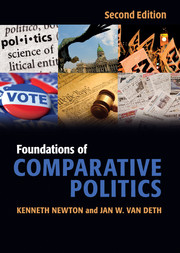Book contents
- Frontmatter
- Contents
- List of briefings
- List of fact files
- List of controversies
- List of tables
- List of figures
- Preface to the second edition
- Acknowledgements
- List of abbreviations and acronyms
- Key terms and concepts
- How to use this book
- Introduction
- PART I The state: origins and development
- PART II The polity: structures and institutions
- PART III Citizens, elites and interest mediation
- PART IV Policies and performance
- 14 Political ideologies: conservatism, liberalism, Christian democracy and socialism
- 15 Decision making
- 16 Defence and security
- 17 Welfare
- 18 The future of the democratic state
- Postscript: How and what to compare?
- Glossary of key terms
- Index of names
- Index of subjects
15 - Decision making
from PART IV - Policies and performance
Published online by Cambridge University Press: 05 June 2012
- Frontmatter
- Contents
- List of briefings
- List of fact files
- List of controversies
- List of tables
- List of figures
- Preface to the second edition
- Acknowledgements
- List of abbreviations and acronyms
- Key terms and concepts
- How to use this book
- Introduction
- PART I The state: origins and development
- PART II The polity: structures and institutions
- PART III Citizens, elites and interest mediation
- PART IV Policies and performance
- 14 Political ideologies: conservatism, liberalism, Christian democracy and socialism
- 15 Decision making
- 16 Defence and security
- 17 Welfare
- 18 The future of the democratic state
- Postscript: How and what to compare?
- Glossary of key terms
- Index of names
- Index of subjects
Summary
Government exists to solve problems. To do this it must take decisions. In one sense, the whole process of government is little else than a ceaseless process of decision making: how to respond to the latest international crisis; whether to increase taxes or cut services; how to balance economic development against environmental needs; how to handle an economic crisis; what to do about traffic congestion. Politics never sleeps, and governments can never pause for a rest. They are assailed from all sides by endless cycles of demands and events, and they must constantly make decisions about options, priorities, policies and courses of action.
This chapter deals with public policies and decision making. A policy is a general set of ideas or plans that has been officially agreed on and which is used as a basis for making decisions. Public policy is a more specific term. It refers to the long series of activities, decisions and actions carried out by officials of government in their attempts to solve problems that are thought to lie in the public or collective arena. In that sense, we speak of ‘environmental policies’ if government shifts from coal and nuclear power to oil and windpowered generators, and of ‘educational policies’ if the school leaving age is raised or money is redirected from primary to secondary education. How can we analyse such public policies in general, when there are so many decisions made and each one has its own specific circumstances?
- Type
- Chapter
- Information
- Foundations of Comparative Politics , pp. 315 - 336Publisher: Cambridge University PressPrint publication year: 2009



